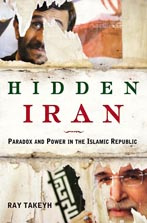Hidden Iran,Paradox and Power in the Islamic Republic

Hidden Iran
Author:Ray Takeyh, Senior Fellow for Middle Eastern Studies Publisher:
A CFR Book. Times Books/Henry Holt Release
Date: October 2006
Overview
For more than a quarter of a century, few countries have been as resistant to American influence or understanding as Iran. The United States and Iran have long eyed each other with suspicion, all too eager to jump to conclusions and slam the door. With the new hard-line Iranian president, Mahmoud Ahmadinejad, making incendiary pronouncements and pressing for nuclear development, the consequences of not understanding Iran have never been higher. In Hidden Iran, Ray Takeyh has written a groundbreaking book that reveals how the underappreciated domestic political rivalries within Iran serve to explain the country’s behavior on the world stage. A leading expert on Iran’s politics and history, Takeyh shows why this country has so often confounded American expectations and inspired a long series of misguided U.S. policies that continue to this day. And yet there is a hidden Iran beyond what we see on the news or hear about from American politicians, one in which political factions jockey for power and influence, politicians fall out of favor only to reemerge a few years later, and the hard-liners, the pragmatists, and the reformers tend to counterbalance one another in the government. Takeyh introduces us to the leading players on all sides and shows how the game of political chess is played in Iran. Much of the saber rattling that so alarms outsiders, he shows, serves primarily to shore up wavering domestic support; in fact, the current nuclear standoff features an inside-outside dynamic similar to the hostage crisis of 1979-81, which Ayatollah Khomeini used to divide his political opponents and secure his own power. Takeyh explains the Iranian view of the world, which transcends political affiliation, and the prominent role the country seeks to play in the Persian Gulf region, in the wider Muslim world, and in relation to its neighbors in Central Asia and the Indian subcontinent. He also offers keen insight into Iran’s tumultuous bilateral relations with Iraq, Israel, and the United States, showing how the U.S. invasion of Iraq has actually put Iran in its strongest strategic position since the first days of the revolution. Hidden Iran points the way toward a new way of managing America’s relationship with Iran, making a persuasive case that the countries’ differing world views need not lead inexorably to conflict.

